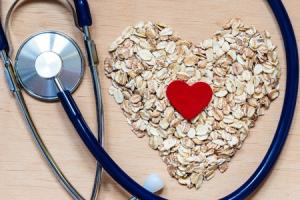What is cholesterol?
Cholesterol is a waxy substance which is made in the body by the liver but is also found in some foods. It plays a vital role in how every cell works and is also needed to make Vitamin D. It helps some hormones and bile for digestion. Eating the correct balance of plant based foods and foods low in saturated fats helps control cholesterol levels. However, too much cholesterol in the blood can increase your risk of getting heart and circulatory diseases and even a heart attack.
Cholesterol is carried in your blood by proteins. When the two combine, they're called lipoproteins.
The two main types of lipoprotein are:
- high-density lipoprotein (HDL) – carries cholesterol away from the cells and back to the liver, where it's either broken down or passed out of the body as a waste product; for this reason, HDL is referred to as "good cholesterol", and higher levels are better
- low-density lipoprotein (LDL) – carries cholesterol to the cells that need it, but if there's too much cholesterol for the cells to use, it can build up in the artery walls, leading to disease of the arteries; for this reason, LDL is known as "bad cholesterol"
The amount of cholesterol in the blood – both HDL and LDL – can be measured with a blood test.
The recommended cholesterol levels in the blood vary between those with a higher or lower risk of developing arterial disease.
What Causes High Cholesterol?
Eating too much saturated fat increases cholesterol levels. This is why it is best to limit the amount of foods we eat that are high in saturated fats. Avoid foods made up of components such as: butter, ghee, hard margarines, fatty meat, full fat cheese, milk, cream and yogurt, coconut and palm oils.
Hereditary diseases and lifestyle choices contribute to high cholesterol including:
- Smoking – a chemical found in cigarettes called acrolein stops HDL transporting cholesterol from fatty deposits to the liver, leading to narrowing of the arteries (atherosclerosis)
- Diabetes or high blood pressure (hypertension)
- Family history of stroke or heart disease
Can You Burn Off Cholesterol?
Unfortunately not. Cholesterol is a type of lipid, just as fats are. However, unlike fat, cholesterol can't be exercised off, sweated out, or burned for energy.
How Do I Control My Cholesterol?
It is essential to be eating the right foods to control cholesterol levels in your body for the better life quality. Foods like eggs, liver and kidneys, and seafood such as prawns are high in cholesterol. Whilst we do get some of our cholesterol from these animal foods – most of us don’t need to limit these because they are also low in saturated fat. Plants do not contain cholesterol and are usually low in saturated fat so vegetables and other plant-based foods such as soya should feature regularly in a diet to lower cholesterol. Vegetables and fruits rich in soluble fibre such as okra, aubergine, citrus fruits, turnip, sweet potato and mango are great for this purpose.
Some of the other plant based foods are considered to be super foods to counter cholesterol. Soya foods, being naturally low in saturated fat, help lower cholesterol in the blood. Seeds and dried nuts are rich in vegetable protein, fibre, heart friendly unsaturated fats, vitamin E, magnesium, potassium, natural plant sterols and a host of beneficial plant nutrients. Both oats and barley are rich in a form of soluble fibre; plant sterols are naturally found in a wide range of foods such as vegetable oils, nuts, seeds, whole grains, fruits and vegetables; and as stated earlier, fruits and vegetables.
Cholesterol and Lipid Profile Test
We provide a lipid profile and cholesterol test. The lipid profile is used as part of a cardiac risk assessment to help determine an individual's risk of heart disease and to help make decisions about what treatment may be best if there is borderline or high risk.
Lipids are a group of adipose tissue and fat-like substances that are important elements of cells and sources of energy. Observing and sustaining healthy levels of these lipids is important in staying fit. The results of the lipid profile are deliberated keeping in mind of the other deficiencies and disease and even side effects like heart diseases, a plan is then formed for the treatment. Depending on the results and other risk factors, treatment options may cause changes in the routine and everyday life such as diet and exercise or including of lipid-lowering medications. A finger prick blood sample is required for the lipid profile test.

